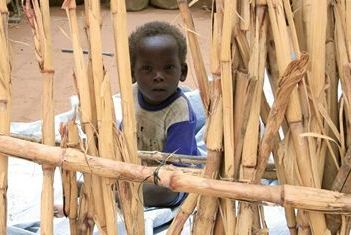EU ambassadors raise concerns over security restrictions in Darfur
October 17, 2012 (KHARTOUM) – European Union (EU) ambassadors have expressed concerns over restrictions imposed by Sudanese security services on the movement of international experts and representatives who visit the country’s western region of Darfur to identify recovery and development projects there.

However, the Sudanese security service blocked their access to the region despite official contacts with the relevant authorities. On Wednesday, a delegation of European ambassadors in Khartoum visited the capital of North Darfur State, El-Fasher, where they raised the issue with the Darfur Regional Authority (DRA) which is tasked with the implementation of the DDPD.
Tadjadine Bechir Niam, DRA Minister of Reconstruction, Development and Infrastructure, told Sudan Tribune that the EU envoys revealed a number of obstacles hindering the implementation of vital projects in the province due to restrictions and other measures by security services.
He added that the authority explained that the issue was already discussed with the competent services and a committee including the deputy head of the National Intelligence and Security Services (NISS) and his person was formed to remove obstacles facing foreign entities in Darfur particularly in terms of visa and freedom of movement.
Niam stressed the importance of close coordination between the foreign ministry, NISS and DRA to prevent any confusion in dealing with foreigners, pointing out that the security service have the right to expel any person who is deemed to be posing threat to national security.
In March 2009, security services expelled 13 foreign aid groups working in Darfur accusing them of spying for the International Criminal Court (ICC) which issued an arrest warrant for President Omer Al-Bashir on charges of atrocities he allegedly masterminded during the peak of Darfur conflict in 2003-2004. The EU is the main supporter of the Hague-based tribunal.
Over the last two weeks, the DRA Darfur authority held a number of workshops in the five states of Darfur to identify needs and set priorities for development projects as well as gathering information pertaining to these projects in order to present it to the upcoming donors’ conference in Doha.
Niam said the EU ambassadors reiterated their support to the DDPD and discussed security situation and the delay in the first installment of fund ($200 million) allocated to reconstruction activities and return of IDPs and refugees.
He further disclosed that the authority intends to send delegations to meet with the rebel groups that rejected the DDPD in the Ugandan capital Kampala and other capitals to convince them to join the peace process.
The regional minister said the head of the joint mission of the African Union and the United Nations in Darfur, “UNAMID” Aichatou Mindaoudou, travelled to Doha, in a bid to bring new groups to join the DDPD.
Niam said that the leaders of the rebel groups are welcome to participate in a conference slated for next November on the voluntary return of IDPs and refugees. He also confirmed their readiness to provide security guarantees to all the rebel leaders who wish to attend.
Last week, the DRA announced that it had invited a splinter group from the Justice and Equality Movement (JEM) and the Sudan Liberation Movement of Minni Minnawi to attend the conference which is due to take place in South Darfur.
DRA security Commissioner told the visiting EU delegation that starting from next November the DRA will be able to deal directly with the security situation in the five states and the governors will cease to handle it, Niam said.
The European delegation comprises the EU, the British, the French, the Netherlands and the Spanish ambassadors in Sudan.
(ST)
